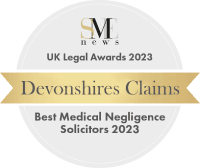Ambulance wait times on the rise
Data collated as part of a study of ambulance callout times in England has revea
Have you suffered due to inadequate medical care? Search our extensive database for information and guidance on your options. Explore medical conditions, understand the legal process, and discover support resources.
Easily find the information you need using smart-search
Select a condition or area of concern to learn more about our specialist legal support.
I cannot thank Justin, Jack and Adam enough for their diligent and conscientious approach to my challenging case. They were always professional, approachable, informative throughout. Many thanks.
I am very happy with the service I got from Justin and his team. From the first day that they started my claim, they have kept me informed of every step they have made with my claim.



 100% No Win No Fee
100% No Win No Fee
* This data will be used by Devonshires Claims for processing your query and for no other purpose.

To start your free case evaluation, or to simply discuss your options, fill out our quick and easy form. A clinical negligence solicitor will be in touch within 24 hours to help with your next steps.
* This data will be used by Devonshires Claims for processing your query and for no other purpose.
Are you unsure whether you have grounds for a medical negligence claim? Our frequently asked questions (FAQs) address common concerns regarding eligibility, procedure, your rights, and potential compensation.
Health professionals such as GPs, consultants, surgeons, nurses, dentists and others have a duty of care to look after a patient to an acceptable medical standard.
Medical or clinical negligence occurs when a health professional provides substandard care which results in injury to the patient or causes an existing condition to get worse. Hospital negligence also occurs if the
standards of the clinical environment fell below what was expected – resulting in infection such as sepsis or MRSA.
If you have sustained a serious injury resulting from medical negligence – either in the NHS or the private medical sector, you could be entitled to make a medical negligence compensation claim.
Legal tests
In order to bring a successful claim for clinical or medical negligence you will need to satisfy two legal tests:
In addition you must prove that you have suffered a loss.
Common examples of medical negligence include:
In 2018-2019,
the NHS reported receiving 10,673 new claims
of medical negligence.
If it can be proven that the health care professional or organisation acted negligently and that this negligence directly led to an injury or made an existing condition worse, you could be entitled to compensation.
To prepare a claim for medical negligence you will need to:
Compensation is broken down into two categories called General and Special Damages
General damages are calculated according to guidelines set by the Judicial College in England & Wales.
Devonshires Claims work hard to obtain the maximum compensation for you. When preparing your case and calculating the compensation you may receive, our medical claims experts will consider:
Devonshires Claims medical negligence solicitors provide a no win no fee claims service. This also
known as a “Conditional Fee Agreement” (CFAs).
The benefits to you are:
Under a conditional fee agreement, you are not charged any legal fees or costs at any time if your case is not successful*. If your case is successful we will seek to recover costs from the defendant. CFAs permit a
maximum deduction of 25% from the compensation you are awarded**.
After the Event Insurance (ATE) :
When acting for our clients on a non win no fee basis, we may advise a client to take out a specialist policy called “After the Event Insurance Policy (ATE) This is usually a small cost and will protect you in the event
that your claim not be successful.
Other funding options
Our experts will provide you with clear information on the process and keep you informed throughout your case.
The time limit is three years from the date of the injury.
Exceptions to the 3 year time limit:
A child:
The exception to this limit is if you are claiming compensation on behalf of a child. You can make a medical negligence claim on behalf of a child at any point until they are 18. Once they turn 18, the individual then
has 3 years within which to make a claim themselves.
Lack of mental capacity:
A child or adult without capacity to run a claim, may not have a time limit within which to bring a claim. We recommend that you contact Devonshires Claims if you have any queries involving those who lack capacity
and our specialist solicitors will be able to assist.
Devonshire Claims medical negligence solicitors take the stress out of making a compensation claim.
Why choose us to represent you?
The majority of medical negligence cases are settled out of court. According to an NHS report, 69.6% of claims in 2017 – 18 were settled out of court, with 29.7 % of cases beginning proceedings and only 0.8% going to
trial.
If your case reaches trial, then the following is likely to occur:
If your medical negligence case reaches trial we will keep you informed on the process.
Because every case is unique there is no defined period within which a medical negligence case will be settled. On average standard cases can take between 2 and 3 years to settle while larger and more complex cases can
take longer, with claims involving children sometimes taking more than 10 years.
If liability is admitted in may be possible to obtain an interim payment before your case is concluded.
Devonshires Claims will advise you on the best approach to take with regard to medical negligence compensation claims..
There are situations where it is advisable to wait before accepting a settlement figure. The reasons for this are:
Medical negligence claims made against the NHS will not only highlight the nature and extent of your injury but it may help prevent it happening to other patients. The compensation awarded to you will:
When making a claim against an NHS GP, nurse or hospital you will be making a claim against the NHS trust.
You can make a medical negligence compensation claim against a private clinician, such as a GP or Dentist, or a private medical facility such as a private hospital or laser eye surgery hospital or clinic.
Parents or guardians may bring a medical negligence claim on behalf of a child.
Devonshires Claims have obtained compensation for many children including those affected by Cerebral Palsy,
Erb’s Palsy and birth defects.
It is possible to bring a claim on behalf of their estate.
In order to instruct us to act in this situation you will need a Grant of Probate or Letters of Administration. In order to bring a claim, there must be a right to such damages by the Estate or Dependants of the deceased, to get more information we would suggest that you get in touch with our experts.
Keep up with the most recent legal developments, acquire insights into particular cases, and be informed about medical negligence issues. This resource centre offers insightful viewpoints on conditions, medical treatments, and your rights.
Data collated as part of a study of ambulance callout times in England has revea

Maternity services ensure the well-being of mothers and infants during one of th
